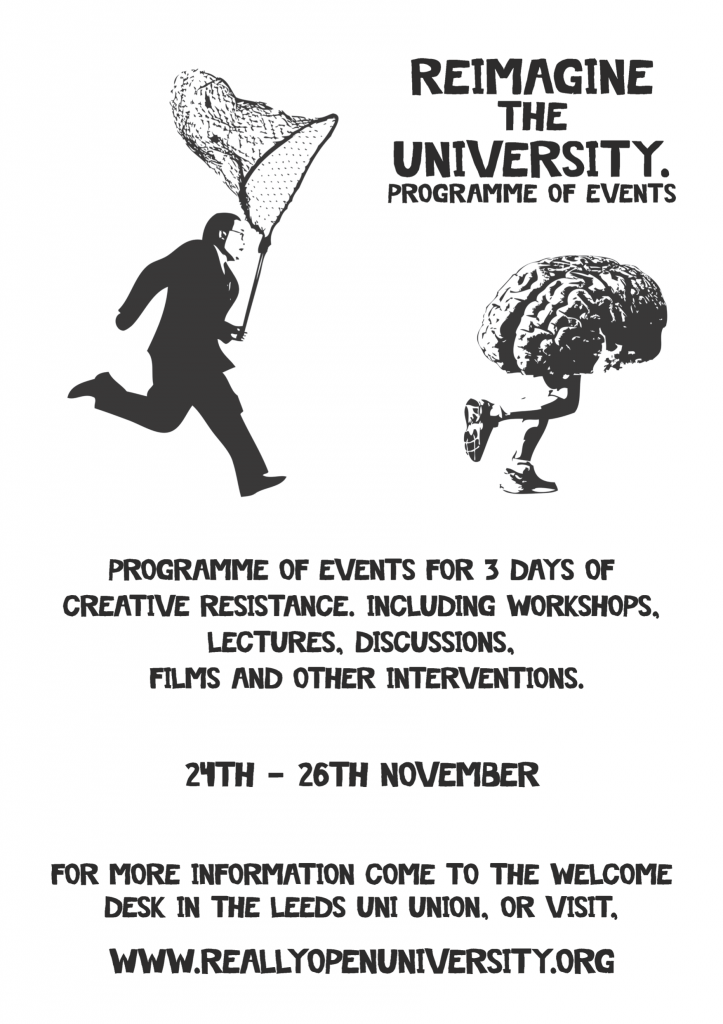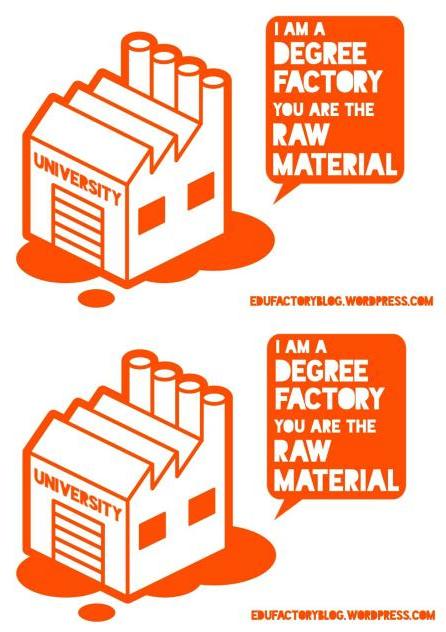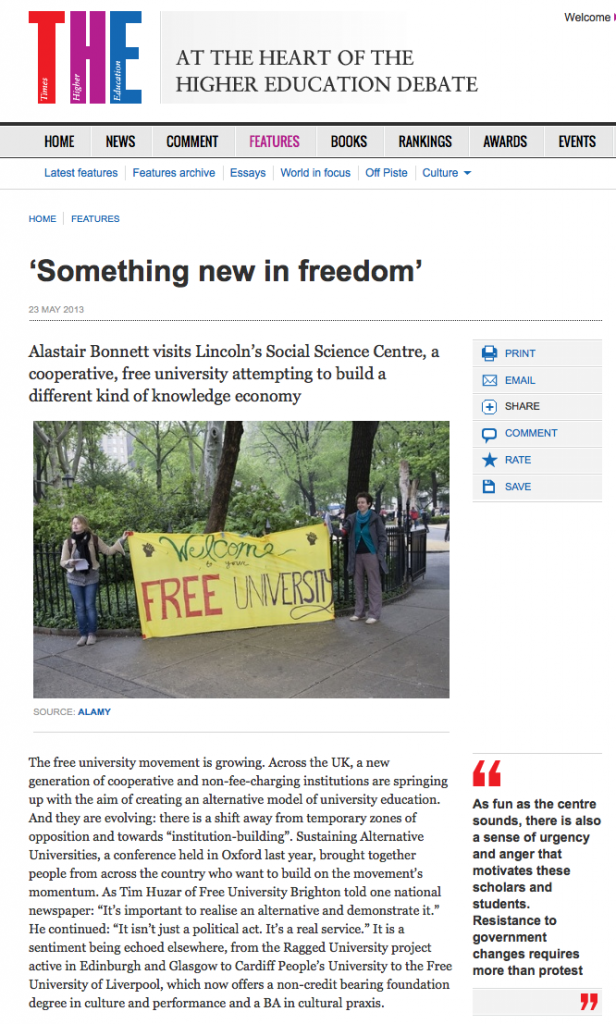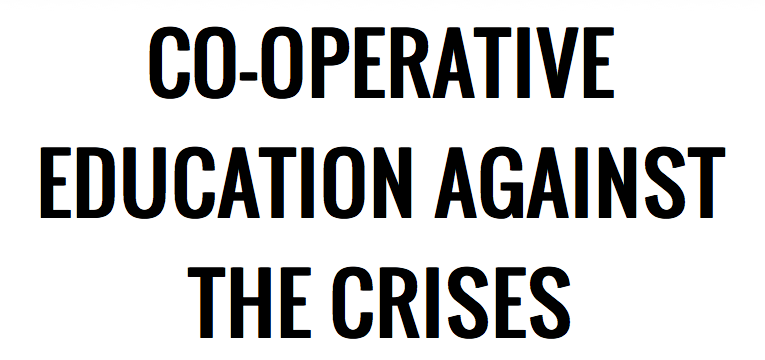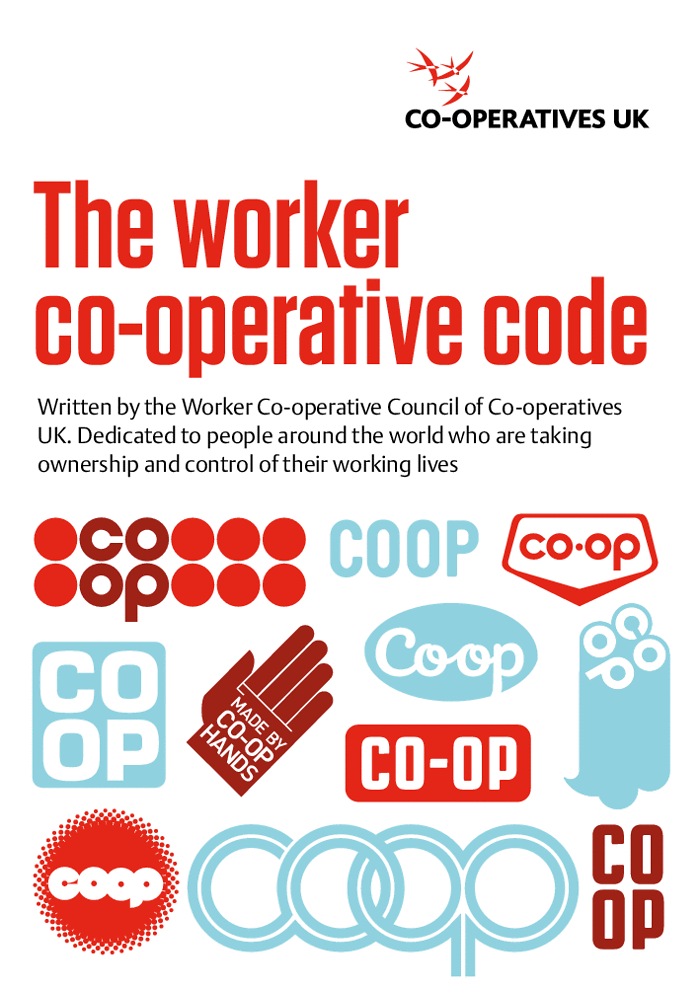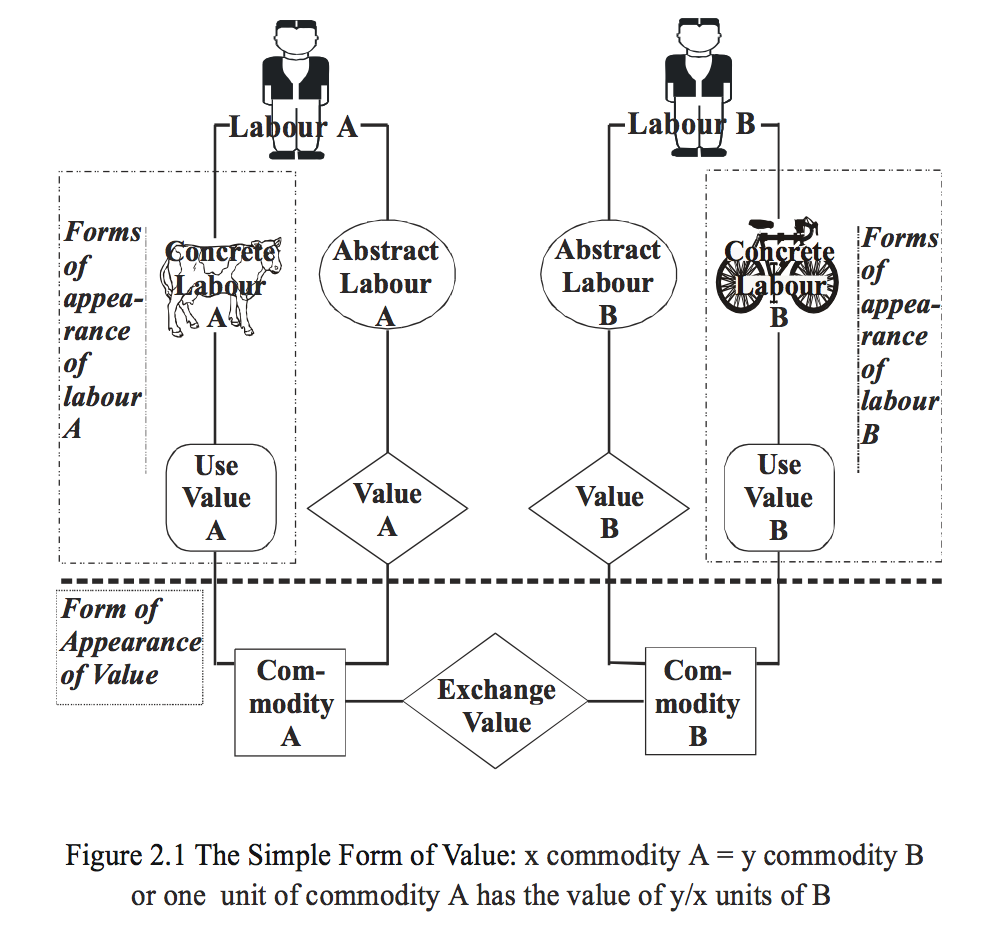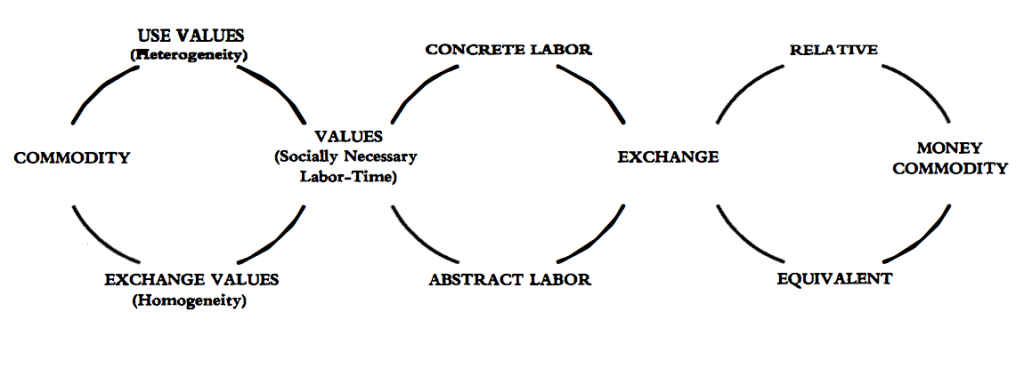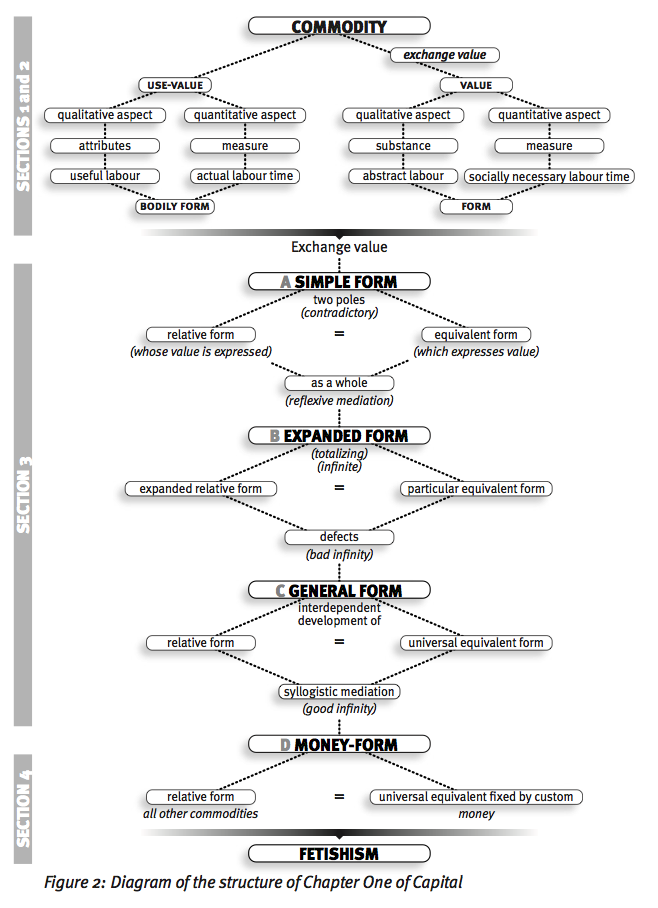In the first part of my notes on ‘open co-operatives’, I focused on Michel Bauwen’s most recent statement, Why We Need a New Kind of Open Cooperatives for the P2P Age. There, he outlines four recommendations for the creation of open co-ops, which are a new synthesis of values and practices of the global P2P, FLOSS and Free Culture movement, with the values, principles and practices of the historic, global co-operative movement. The recommendations are:
- That coops need to be statutorily (internally) oriented towards the common good
- That coops need to have governance models including all stakeholders
- That coops need to actively co-produce the creation of immaterial and material commons
- That coops need to be organized socially and politically on a global basis, even as they produce locally.
Earlier, I made notes on the first two points, suggesting that the co-operative movement indeed already addresses these in quite substantial ways. What appears to be especially novel about Michel’s proposal for ‘open co-ops’ is that the principle and practice of ‘common ownership’ is extended to the product of the co-operative as well as the means of production. This is novel from the point of view of traditional co-operatives, but taken for granted in the world of P2P, FLOSS and Free Culture. However, what that movement lacks is the innovation and experience in developing complementary organisational forms, which the co-operative movement has been working on for over 150 years.
What is also important to note, is that Bauwens regards all of this work on open co-ops, not as the ultimate objective, but as necessarily transitional to the practice of communism, as coined by Marx: ‘From each according to their abilities to each according to their needs’.
Here, I want to focus on Michel’s third recommendation, having just read a number of other articles that discuss the Peer Production ‘Copyfarleft’ License (PPL). More specifically, I consider part (a) of his third recommendation which is intended to address the creation of a self-sustaining immaterial commons. Part (b) of his recommendation, which is the creation of a self-sustaining material commons is not directly addressed here, although many of my comments will be relevant. I will return to this and his fourth recommendation at a later date.
*
The Peer Production License (PPL) was created by Dmytri Kleiner. It is based on the Creative Commons BY-NC-SA v3.0 license and includes an additional restriction (point three below) to those that already exist in the CC license:
- Share-alike/Copyleft: This requires the consumer of the product to license their derivative product under the same terms as the originating product, such that the benefits of each creative work licensed under these terms perpetuate. This resists outright ‘free-loading’ and strategically develops a commons of social property, which is based on a general, indirect degree of reciprocity. This social property is not ‘public’ in terms of regulated by the state, nor individually or collectively ‘private’ as in joint-stock. It is created through what Pedersen (2010) neatly refers to as ‘reciprocity in perpetuity’.
- Non-commercial: The work cannot be used for commercial advantage or private monetary gain i.e. profit. This resists the exploitation of the commons for money, or put another way, it resists the expansion of the value-form of commodities into the money form while still being trapped in the value-form.
- Co-operative: This is an exception to the non-commercial clause above which states that commercial use can be made of the product by democratic, worker-owned organisations that distribute their profits among themselves e.g. co-operatives. This is to allow for and promote the use of the common property of co-operatives in their mutual interest of building a commons. It applies to the immaterial, non-rivalrous knowledge products of the co-operatives. This is the novel addition to the original CC-BY-NC-SA license. It permits a restricted type of commercial use among co-ops while resisting the dissolution of the commons into the anti-social private sphere.
- The producers of the work should be acknowledged: This resists the dissolution of the property into the public domain and ensures that the originating producer(s) are respectfully credited for their contribution. It also adds a dimension of transparency and traceability as to the provenance of each contribution. This is important for a system, such as that proposed by Bauwens and Kleiner, which is based on any kind of reciprocity and equivalence, including that of money.
The PPL license has been discussed in four recent articles:
Miguel Said Vieira & Primavera De Filippi (2014) Between Copyleft and Copyfarleft: Advanced reciprocity for the commons.
Michel Bauwens, Vasilis Kostakis (2014) From the Communism of Capital to Capital for the Commons: Towards an Open Co-operativism.
Vieira and De Filippi provide a good discussion of what the PPL offers, the reasoning behind the license, and its advantages and disadvantages. The main advantage, they say, is that the PPL offers a license that sits between standard copyleft (e.g. GPL) licenses and non-commercial copyleft licenses (e.g. CC-BY-NC-SA). Kleiner’s intention in restricting commercial use of the commons property is to restrict its use to those organisations that do not exploit labour (in the technical sense of paying labour less than its actual value) and thereby resist the alienation of labour.
Kleiner is said to have referred (I can’t find a direct reference) to this as the ‘non-alienation clause’. The assumption here is that democratically controlled, worker-owned co-operatives overcome the alienation of wage labour because, in effect, they act as their own capitalist and do not draw a wage as such, but rather they draw from the surplus they collectively make. I have discussed this at length with reference to Jossa’s work on Labour Managed Firms (here, here). Most recently, Jossa has conceded that in fact such firms do not fully overcome alienation, a point that was clear to me from engaging with his earlier work, where I wrote:
“In the absence of the wage-relation i.e. the LMF, workers sell the products that they created and own, rather than sell their labour for a wage. It seems that for Jossa, the key to the capitalist firm and therefore the ‘anti-capitalist’ LMF, turns on how property relations are organised. For Jossa, freedom from capitalism is equated with owning the means of production and from that “decisive” moment, a transition from the capitalist mode of production to the socialist mode of production occurs (Jossa, 2012b:405). For Jossa, once property relations are re-organised in favour of the worker, such that the wage can be abolished, labour is no longer a commodity and its value is no longer measured in abstract labour time because “work becomes abstract when it is done in exchange for wages.” (Jossa, 2012a: 836)”
The problem with Jossa and with the idea of a ‘non-alienation clause’ is that it overlooks or misunderstands the nature of alienation. As I have said before, “What Jossa seems to overlook is that ‘value’, not the wage, mediates labour in a capitalist society.”
In a Preface to Capital, Marx referred to the commodity as the “economic cell-form” from which everything else in capitalist society can and should be examined. According to Marx, in Capital Vol. 1, Ch. 1, a commodity is characterised by having a use-value and an exchange-value. The use-value is the product or service’s utility and the exchange value is its value, or rather the exchange value is the the realisation of the commodity’s value. The value of a commodity is expressed in its exchange value.
Marx said that an understanding of political economy (i.e. capitalism) “pivots” on the understanding of the dual character of labour, as it is expressed in the dual character of the commodity. That is, the use value of the commodity is an expression of the concrete character of labour and the exchange value (value) is the expression of the abstract character of labour. By ‘abstract labour’, Marx was defining the way that value is determined not by the amount of concrete labour that someone put into the production of the commodity, measured by clock time (this was the common view of political economists at that time), but by the homogeneous mass of labour as it exists at any one time as a social whole. This qualitative and commensurable character of labour is quantified, not by clock time, but by ‘socially necessary labour time’, or
“the labour time required to produce any use-value under the conditions of production normal for a given society and with the average degree of skill and intensity of labour prevalent in that society.” (Marx, Capital)
Marx’s discovery was not simply that labour is useful and can be exchanged like any other commodity, but that its character is “expressed” or “contained” in the form of other commodities. What is expressed is that labour in capitalism takes on the form of being both concrete, physiological labour and at the same time abstract, social, homogeneous labour. It is the abstract character of labour that is the source of social wealth in capitalism (i.e. value) and points to a commensurable way of measuring the value of commodities and therefore the wealth of capitalist societies.
What Jossa and perhaps other advocates of worker co-operatives overlook is that in order to understand the social form of wealth in capitalist societies (i.e. ‘value’ ultimately expressed in money), we have to, according to Marx at least, understand the true nature of the commodity as an expression of a particular, historically specific, form of labour which is socially divided by the imposition of private property and other coercive forces; it becomes mediated by value in the form of money, which allows access to that property. Labour should not simply be understood as concrete, physiological labour, but simultaneously as the abstract, social mass of global labour that now extends to most societies across the world. Likewise, the measure of the value of that labour and therefore the commodities it produces, is also characterised by a dynamic, globally determined measure of the social labour time necessary to produce all commodities. In practice, this means that if a person can produce a widget in the Far East in less time than a person in Europe, that efficiency will find its way into determining, through competitive markets, the overall productivity of those widgets and impact on the value of the commodity and therefore the value of the labour in Europe. In this way, as Marx argued, increasing productivity decreases the value of a commodity and pushes down the value and social necessity of labour, rendering an increasing population superfluous to capital’s needs (i.e. under- and unemployment).
As I have argued before,
“In dismissing abstract labour as something overcome in the wage-less Labour Managed Firm, Jossa remains trapped by an economistic understanding of social relations and therefore trapped by value. The same can be said for the worker co-operative form in general. It is a transitional organisational form that moves away from attributes of capitalist labour (towards ownership of the means of production, a democratic division of surplus), but does not in itself overcome the determination of value imposed by the competition of the market.
Freedom is not the emancipation of labour, as in Jossa’s argument, but rather the emancipation from the twofold character of labour, a point also made by Postone, Neary, the Krisis group and others.”
On account of all this, I agree with Meretz‘s excellent critique of copyfarleft, where he concludes:
“Despite all his radical rhetoric, Dmytri Kleiner doesn’t want to touch the basic principles of commodity production. All he wants is a slightly more equal distribution of wealth based on commodity production. This has been the goal of many people, a lot of people have tried to realise it, and despite so many defeats many people still want it. They will not succeed. It is simply not sufficient to achieve workers’ control over the means of production if they go on being used in the same mode of operating. Production is not a neutral issue, seemingly adaptable for different purposes at will, but the production by separate private labour is necessarily commodity production, where social mediation only occurs post facto through the comparison of values – with all the consequences of this – from the market to ecological disaster.”
This is a common critique by Marxists of the potential of worker co-operatives. Effectively, they ‘degenerate’ into capitalist firms (see Egan, 1990) because they are forced to participate in a competitive marketplace alongside traditional capitalist firms. They are accused of focusing too much on the democratic ownership and control of property, while ignoring the fundamental character of the capitalist mode of production. I understand this and agree that it is almost certain to happen. However, does this mean that democratically controlled producer co-operatives are in fact a dead end? I don’t think so and from Bauwen’s text on open co-operatives and other articles I have read, his insistence that P2P and open co-ops are to be understood as ‘transitional’ forms of production and property ownership, suggests that he is also aware of this, but at the same time is concerned with what can be done in today’s historical, material conditions.
We can see this in a more recent exchange between Meretz and Bauwens regarding the Peer Production License. Meretz published a critique of the PPL, in which I think he rightly critiques the notion of ‘reciprocity’ as required by the PPL and Copyfarleft. As I noted above, the value of a commodity is expressed or realised by its exchange value. Marx discussed at length what is meant by exchange value and what is occurring in the act of exchange in capitalism. He referred to this as the ‘value form‘ and with great dialectical rigour, began by discussing it in its ‘simple form’ and then ‘expanded form’, then ‘general form’ and final as the ‘money form’. In effect, he begins by discussing value most abstractly and gradually develops his theory to find its expression in the concrete form of money.
At the heart of the value form (i.e. that which socially characterises value in capitalism), is the idea of equivalence achieved through the exchange of commodities. The value of one or more commodities enters into a relationship with one or more other commodities, whereby each is simultaneously relative and equivalent to the other. The value of one commodity is achieved in its confrontation with another. Meretz understand all of this well and rightly argues that the PPL limits reciprocity while the GPL promotes it. The term ‘reciprocity’ is used by Bauwens and Kostakis to describe a fair exchange between people. Therefore, what makes an exchange under the PPL license reciprocal requires a qualitative understanding of the contribution being made and a quantitative measure of that contribution. This is exactly what, according to Marx, capitalism has achieved in its organising principle of wage labour and private property mediated through the money form. Abstract labour is the qualitative ‘substance’, measured by socially necessary labour time. For Bauwens and Kostakis, it appears that among open co-operatives, this form of exchange is replaced by a more direct form of negotiation:
“the PPL/Commons-based reciprocity licenses would indeed limit the non-reciprocity for for-profit entities, however they would not demand equivalent exchange but only some form of negotiated reciprocity.”
In their paper on the PPL, Vieira and De Filippi attempt to tackle this issue by proposing an alternative or complementary license which better defines the reciprocal contribution required, suggesting that “only those who contribute to the commons are entitled to commercially exploit them – but only to a similar or equivalent extent (i.e. they can take only as much as they have given to the commons).” They then go on to propose a non-circulating “peer-currency” system of tokens. They argue that their additional reciprocity clause “introduces an expectation of ‘advance reciprocity’… because every entity has to contribute beforehand in order to obtain tokens and thus make commercial uses of the commons.” The result of this, they suggest, is that “large corporations such as Google or Facebook will only be able to use their work to the extent that they contribute back to the commons – either by producing and contributing for the commons in order to obtain credits, or by paying the proper licensing fees.”
To be honest, I don’t know what to make of this. On the face of it, it seems absurd to me since we already have a token system intended to ensure equivalent reciprocity: Money. I also can’t see how it changes anything in terms of the large corporations benefiting more from the work of smaller producers since a large corporation can afford to make their like-for-like contribution quite easily, whereas it would be very difficult for a small worker co-op to match the contribution of the large corporation – reciprocity extends both ways. Anyway, putting that aside, a system of non-circulating tokens is something that Marx suggested might be necessary in the transition towards full communism, as he recognised that during this transitional state, people would still expect to receive an equal amount back in return for their labour:
“Accordingly, the individual producer receives back from society — after the deductions have been made — exactly what he gives to it. What he has given to it is his individual quantum of labor. For example, the social working day consists of the sum of the individual hours of work; the individual labor time of the individual producer is the part of the social working day contributed by him, his share in it. He receives a certificate from society that he has furnished such-and-such an amount of labor (after deducting his labor for the common funds); and with this certificate, he draws from the social stock of means of consumption as much as the same amount of labor cost. The same amount of labor which he has given to society in one form, he receives back in another.
Here, obviously, the same principle prevails as that which regulates the exchange of commodities, as far as this is exchange of equal values. Content and form are changed, because under the altered circumstances no one can give anything except his labor, and because, on the other hand, nothing can pass to the ownership of individuals, except individual means of consumption.
But as far as the distribution of the latter among the individual producers is concerned, the same principle prevails as in the exchange of commodity equivalents: a given amount of labor in one form is exchanged for an equal amount of labor in another form”
When Bauwens and Kostakis state, “A commons-based reciprocity license would simply ask for reciprocity”, I think they are underestimating the difficulty of achieving this in practice. Not only that, but the GPL and other Copyleft licenses have taken us beyond the point of requiring reciprocity. Further on in their article, critically discussing the GPL, they refer to
“what anthropologists call ‘general reciprocity’, that is at the collective level, a minimum of contributions is needed to sustain the system. Nevertheless there is absolutely no requirement for direct reciprocity. The reciprocity is between the individual and the system as a whole.”
My view, and I think it is Meretz’s too, is that this is actually a very positive thing, which from an understanding of the value-form, moves us away from the imposition of equivalence on all aspects of social life. Yet, against the GPL, Bauwens and Kostakis are arguing for a more “direct” form of reciprocity which would be enforced by the PPL.
As I said in my first set of notes on open co-ops: Reciprocity is the logic of (imposed) scarcity. Non-reciprocity is the logic of abundance. Although Meretz goes on to define a distinction between ‘positive reciprocity’ and ‘negative reciprocity’, I don’t think this is helpful. The aim should be to altogether overcome the compulsion of reciprocity, which is the logic of poverty, protected by law.
“In modern society, where the conditions of life are private property, needs are separated from capacities. A state of abundance would alter this. Needs and capacities would come together, and close off the space between them. In modern society, this space is filled by the dense structures of private property-political order and the law of labour: in a state of abundance they would have no place. If the productive capacities already deployed were oriented towards need, necessary labour would be reduced to a minimum, so that nothing would stand between men and what they need to live. Money and the law of labour would lose their force, and, as its foundations crumbled, the political state would wither away. The state of abundance is not a Utopian vision but the real possibility of conditions already in existence.” (Kay and Mott 1982)
Yet, again I am reminded of Marx’s Critique of the Gotha Programme, where he recognises that the material premises have to be in place and apparent to the majority of individuals in society in order for the logic of the former social conditions to be abandoned:
“Right can never be higher than the economic structure of society and its cultural development conditioned thereby.”
The GPL is a license that recognises the premise of abundance in the immaterial social realm, where the notion of “each to each” can exist in practice. Although still an expression of liberal capitalist jurisdiction, it is an expedient means towards developing and demonstrating the premises for communism. My view is that for the immaterial commons, the GPL remains adequate to the task of growing that commons – criticisms of it being non-reciprocal are confusing reciprocity with equivalence, which is one of the reasons we should be against reciprocity altogether.
The ‘communistic’ nature of the GPL has been discussed at length by Jakob Rigi, who also bases his argument on the theoretical and methodological foundations developed by Marx. In his response, he states:
“I commend Bauwens & Kostakis for their activist approach and their good intentions to develop an alternative to capitalism and establish an ethical economy. Unfortunately, however, their approach not only fails to achieve these goals, but perpetuates capitalism.” (2014: 393)
He argues that Bauwen and Kostakis’ desire (as expressed in the PPL) to retain the essential categories of capital (e.g. surplus value, profit) only perpetuates capitalism. Rigi goes into great detail in his discussion about how co-operatives are trapped by the logic of capitalism and must at some point degenerate, die, or overcome the necessity of commodity production. On this, he agrees with Meretz:
“To sum up the cooperative is implicated in the capitalist mechanism of exploitation either as an exploited or exploiting party in the both processes of the formation of values and that of the production prices of the commodities they produce. A single commodity is a social interface (relation) in a double sense. On the one hand as a value bearing entity it is an interface between all labour that produces that type of commodity. And on the other, as a price bearing entity it is an interface between all constituent elements of the total social capital, i.e. the capitalist economy as a whole. No magic of cooperation can change these realities. The only way for cooperatives to break with the logic of capital is to break with the market, i.e. not to produce commodities.” (Rigi 2014: 395)
Rigi provides a good discussion on the parasitic nature of rent, arguing that knowledge products, e.g. software, literally have no value, and that along with interest on capital, rent should be part of the total abolition of capitalism. He agrees that “the idea of peer-producing cooperatives as a platform for launching peer-production is appealing. But these cooperatives’ main direction should be to work against the market and money and break with them.” (397)
In principle, I agree, but Rigi’s critique remains adhered to a traditional view of worker struggle against capital and overlooks the implications of his own explanation of the labour theory of value. He begins his critique of Meretz’s rejoinder to Bauwens and Kostakis by stating:
“I agree with most of Meretz’s criticism of Bauwens & Kostakis. However, I find two problems in his rejoinder. His distinction between exchange and reciprocity is not helpful. Second, he does not grasp the GPL’s communist nature and its revolutionary-transformative historical potentials..” (398)
Likewise, I agree with most of Meretz’s criticisms, too, but as with Meretz, a problem remains with Rigi’s understanding of reciprocity in terms of capitalist exchange, too.
“Of course, Meretz is correct that the GPL as a license is a contract, a juridical form, a social rule and not immediately reciprocity. But this contract stipulates a universal reciprocity, and in this sense it is communistic. Communism is nothing but universal reciprocity… Communism is nothing but realization of individual potentials through voluntary participation in social production and making the product available to all members of society regardless of their contributions.” (398-9)
To develop his argument around reciprocity and exchange, Rigi draws on the work of Marshall Sahlins (1974). He states that Sahlins’ study of ‘Stone Age Economics’ distinguished between three different types of reciprocity: “negative (commodity exchange), balanced (gift exchange) and general reciprocity.” Bauwens and Kostakis regard the GPL license as promoting ‘general reciprocity’, where “there is no logic of equivalence, you give without expecting to receive something back directly.” (Rigi 2014: 398) Rigi argues that the GPL does not fit any of Sahlins’ forms of reciprocity because,
“the giver always receives back something larger (the whole im- proved software = the sum of all contributions) of what s/he gives (her/his contribution). On the other hand the receiver is not obliged to contribute, i.e. s/he receives the sum of all contributions without being obliged to contribute as long as s/he does not publish the derivative. We may call this a communist form of reciprocity.” (398)
Just as Meretz wants to distinguish between positive and negative forms of reciprocity, Rigi is also unable to abandon the idea and creates another sub-category of reciprocity, too. As I stated above, it is my view that, according to Marx’s labour theory of value, communism is the overcoming and negation of the conditions that require reciprocity (i.e. scarcity and poverty) and that “each according to each” describes a social world where no concern for reciprocity remains.
Both Meretz and Rigi understand the centrality of the mode of production in capitalism, over and above the mode of distribution. Both authors understand Marx’s labour theory of value, too. Yet both critics of the PPL and open co-operatives, fall back on a critique of exchange and distribution, rather than fully engaging in a critique of production.
Why is it so difficult for us to abandon the idea of reciprocity in a future society of abundance? Sahlins’ ‘negative’, ‘balanced’ and ‘general’ forms of reciprocity are each conditioned by specific, historical modes of production and their subsequent social customs. It is impossible to determine the precise nature of communist, or post-capitalist society but according to Marx, we can say that ‘post-capitalism’ points to a society where value has been abolished as the form of social wealth.
What does it mean to abolish value? It means that the ‘value form’ (the exchange of relative and equivalent use-values) no longer mediates our social relations as it does today and this means that our social relations are no longer determined by the ‘commodity form’ (the necessity to produce use-values primarily for exchange-value). And because the commodity form is nothing more than the expression of the dual character of labour (concrete and abstract labour), we find that the abolition of value is in fact the abolition of labour, or rather capitalism’s dual form of labour. Since it is absurd to suggest that any future society would abolish the physiological requirement of usefully expending energy, the abolition of labour is not the abolition of concrete useful labour, but the abolition of the abstract, social, homogeneous form of labour brought about due to the division of labour and its corresponding institution of private property. With this uniquely capitalist qualitative form of labour abolished, so would its measure (and therefore the measure of value) of ‘socially necessary labour time’ be overcome, too. In moving towards such a society, labour, according to Marx, would transition gradually from being indirect as it is now, mediated by exchange, to being ‘direct labour’, characterised not by reciprocity, but by the custom of “each according from their ability to each according to their own.” Such a social custom is not the product of the creation of a new form of exchange, but rather a new mode of production based on freely associated concrete labour. Freedom then, is freedom from abstract labour measured by socially necessary labour time (i.e. freedom from value). That ‘freedom’ from abstract (wage) labour is currently being objectively imposed on the under and unemployed. The challenge for the open co-operative movement is to create a new, sustainable form of social wealth, built upon the general social knowledge developed through the capitalist mode of production, such that we might be fortunate enough to abandon the capitalist social factory altogether.
Elsewhere (and here), I have highlighted the importance of Peter Hudis’ recent work in understanding Marx’s views on post-capitalism. I think it is especially valuable in thinking about the issues I have discussed around ‘open co-operatives’ not least because his work recognises both the necessity of abolishing value, but also the importance of worker co-operatives as a means to achieve that aim.
Hudis, quoting Marx, notes that in the transition to post-capitalism “social relations become ‘transparent in their simplicity’ once the labourers put an end to alienated labour and the dictatorship of abstract time.”
“Marx is not suggesting that all facets of life become transparent in the lower phase of socialism or communism; indeed, he never suggests this about conditions in a higher phase either. He is addressing something much more specific: namely, the transparent nature of the exchange between labor time and products of labor. This relation can never be transparent so long as there is value production; it becomes transparent only once indirectly social labour is replaced by directly social labour.” (209-10)
Direct labour then, is a transparent process instead of the opaque process of indirect, value-creating, alienated capitalist labour. The conditions for this form of labour do not simply come about by wishing for them or even demanding them, but are the outcome of historical conditions of production, as Hudis explains:
“Marx does not, of course, limit his horizon to the initial phase of socialism or communism. He discusses it as part of understanding what is needed in order to bring to realization the more expansive social relations of a higher phase. Marx conceives of this phase as the passing beyond of natural necessity—not in the sense that labor as such would come to an end, but rather that society would no longer be governed by the necessity for material production and reproduction. This higher phase, however, can only come into being as a result of a whole series of complex and involved historical developments, which include the abolition of the “the enslaving subordination of the individual to the division of labor, and thereby also the antithesis between mental and physical labor.” It is impossible to achieve this, he reminds us, in the absence of highly developed productive forces. Marx never conceived it as possible for a society to pass to ‘socialism’ or ‘communism’ while remaining imprisoned in conditions of social and technological backwardness. And yet it is not the productive forces that create the new society: it is, instead, live men and women.” (210)
Direct labour is made possible by the human development of productive forces that provide the requisite conditions of abundance so that the conditions of material and therefore social necessity are surpassed and we are no longer subordinated to the necessity of the division of labour in order to achieve such levels of productivity and abundance. Capitalism has achieved the current levels of productivity and abundance precisely through co-operation, which Marx called the the “fundamental form of the capitalist mode of production.”
“When numerous labourers work together side by side, whether in one and the same process, or in different but connected processes, they are said to co-operate, or to work in co-operation… Co-operation ever constitutes the fundamental form of the capitalist mode of production.” (Marx, Capital Vol.1, Ch. 13)
We should be mindful that ‘co-operation’ is fundamental to the capitalist mode of production in that it represents the socialisation of labour that has been divided and alienated from its product. In their earlier work, Marx and Engels explicitly argued for the abolition of the division of labour. For example:
“We have already shown above that the abolition of a state of affairs in which relations become independent of individuals, in which individuality is subservient to chance and the personal relations of individuals are subordinated to general class relations, etc.—that the abolition of this state of affairs is determined in the final analysis by the abolition of division of labour. We have also shown that the abolition of division of labour is determined by the development of intercourse and productive forces to such a degree of universality that private property and division of labour become fetters on them. We have further shown that private property can be abolished only on condition of an all-round development of individuals, precisely because the existing form of intercourse and the existing productive forces are all-embracing and only individuals that are developing in an all-round fashion can appropriate them, i.e., can turn them into free manifestations of their lives. We have shown that at the present time individuals must abolish private property, because the productive forces and forms of intercourse have developed so far that, under the domination of private property, they have become destructive forces, and because the contradiction between the classes has reached its extreme limit. Finally, we have shown that the abolition of private property and of the division of labour is itself the association of individuals on the basis created by modern productive forces and world intercourse.” (More examples here)
So, to return to my question above: Why is it that even Marxists, who have a grasp of the labour theory of value, end up arguing for new forms of distribution to supersede the existing form?
The essential work of Historian, Moishe Postone, provides an answer:
“I attempted, through a close reading of the most fundamental categories of Marx’s critique of political economy, to grasp the most basic features of capitalism – those that characterize the core of the social formation through its various historical configurations. On that basis I argued that traditional Marxism took basic features of liberal capitalism – the market and private ownership of the means of production – to be the most fundamental features of capitalism in general. Relatedly, it regarded the category of labor as the standpoint from which capitalism was criticized. Capitalism became identified with the bourgeoisie; socialism with the proletariat.
According to my interpretation, however, far from being the standpoint of the critique of capitalism, labor in capitalism constitutes the central object of Marx’s critique and is at the heart of Marx’s core categories of commodity and capital. I argued that, at the heart of the social formation is a historically specific form of social mediation constituted by labor – namely, value. This form of mediation (which is also a form of wealth) is at the same time a historically specific form of domination that can be expressed through, but is not identical with, class domination. It is abstract, without any specific locus, and is also temporally dynamic. This form of domination, which appears as external necessity, rather than as social, generates both the mode of producing in capitalism as well as its intrinsically dynamic character. It is, of course, impossible to even begin to go into the complexity of the issues involved, but several important implications are that industrial production, which historically comes into being under capitalism, does not represent the foundation of socialism, but is intrinsically capitalist; that the problem with growth in capitalism is not only that it is crisis-ridden, but that its very form of growth itself is problematic; that the existence of the bourgeois class is not the ultimate defining feature of capitalism and that state capitalism (briefly described by Marx as early as 1844) can and has existed; finally, that the proletariat is the class whose existence defines capitalism , and that the overcoming of capitalism involves the abolition, not the glorification, of proletarian labor.
Traditional Marxism had already become anachronistic in a variety of ways in the 20th century. It was unable to provide a fundamental critique of the forms of state capitalism referred to as “actually existing socialism.” Moreover, its understanding of emancipation appeared increasingly anachronistic, viewed from the constituted aspirations, needs, and motivating impulses that became expressed in the last third of 20th century by the so-called “new social movements.” Whereas traditional Marxism tended to affirm proletarian labor and, hence, the structure of labor that developed historically, as a dimension of capital’s development, the new social movements expressed a critique of that structure of labor, if at times in an underdeveloped and inchoate form. I argue that Marx’s analysis is one that points beyond the existing structure of labor.”
I realise that by this point I have departed from a direct response to Michel Bauwens’ statement on open co-operatives, but in doing so, I have begun to respond to his critics (with whom I share many views), and to the implications of Bauwen’s proposed project. Although the implications of the abolition of labour and the subsequent abolition of private property and capital itself may seem like a pipe-dream, it is also a necessity. Marx does offer a rigorous and compelling theory for why it must be undertaken and to a lesser extent how it can occur. His work was by no means complete and it requires constant re-evaluation in light of our own historical conditions, but as Postone remarks, that re-evaluation also requires an engagement with the fundamental categories of capitalism in order to grasp its basic features.
Postone argues that industrial production is intrinsic to capitalism, which suggests that post-capitalism will be characterised by a post-industrial form of production. P2P production could be, as Bauwen’s argues, a “proto-mode of production” for a future society, and producer co-operatives of freely associated labour could be its organisational form. Postone and Hudis‘ respective re-evaluations of Marx’s work, as well as others such as Kurz and Trenkle, offer compelling critiques of our existing mode of production, not from the standpoint of labour but as critiques of labour itself.
The successful creation of a post-capitalist society will require a thoroughly global perspective, rather than a retreat into localism and guild-like modes of production and it will build on the achievements of capitalism as a highly productive, though devastating historical mode of production. The latter sections of Rigi’s paper provide a sketch of what this might look like and one point is key: “These cooperatives must be revolutionary, second, they must break with the market as much as they can.” This insistence that co-operatives and its members are political activists accords with Kasmir’s study of Mondragon, the world’s largest co-operative. It’s failings as a co-operative, she argues, is because of its disconnect with working-class objectives, such that workers “do not consider the firms theirs in any meaningful way.” Kasmir (1996) argues that one of the lessons we can learn from Mondragon is that of the “importance of politics, the necessary role of organization, and the continuing value of syndicates and unions for transforming the workplace.” (199-200) Members of a worker co-operative must regularly question how their mutual work forms a critical, social project. “If workplace democracy is to be genuine, it seems that it must be premised on activism.” (199)
In my view, the combination of knowledge and experience from within the international P2P movement and that of the international co-operative movement, under the banner of ‘open co-operativism’ is a very positive move and Bauwens work (as well as Kleiner and others) is important for initiating this and providing us with something to respond to and collectively develop, in both theoretical and practical ways.
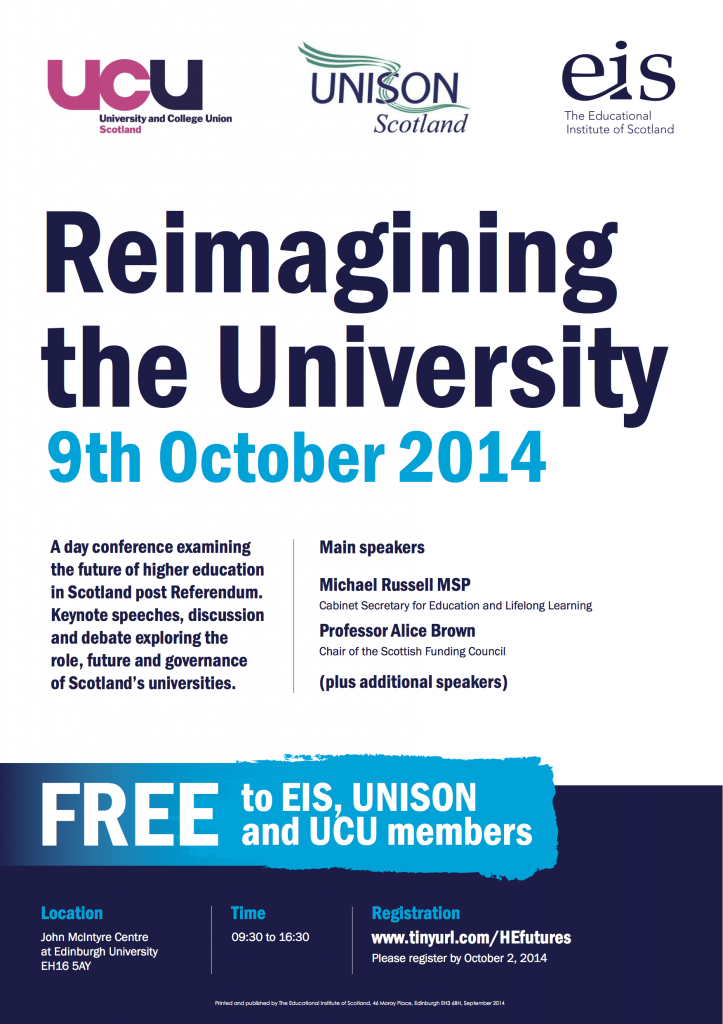 I was told that there is a much stronger sense of resistance in Scotland to the changes they see being undemocratically imposed in England and more opportunity for dialogue between the unions, academics, students and policy-makers. We only have to look to Scotland to see that the conditions we face in England are not inevitable. That there is some kind of alternative. More so, if we look to continental Europe where recently all German universities removed their tuitions fees. Denmark, Sweden and Finland do not charge fees either. However, my talk today is not about fees, but about something that I think is more fundamental than how money circulates in our sector.
I was told that there is a much stronger sense of resistance in Scotland to the changes they see being undemocratically imposed in England and more opportunity for dialogue between the unions, academics, students and policy-makers. We only have to look to Scotland to see that the conditions we face in England are not inevitable. That there is some kind of alternative. More so, if we look to continental Europe where recently all German universities removed their tuitions fees. Denmark, Sweden and Finland do not charge fees either. However, my talk today is not about fees, but about something that I think is more fundamental than how money circulates in our sector.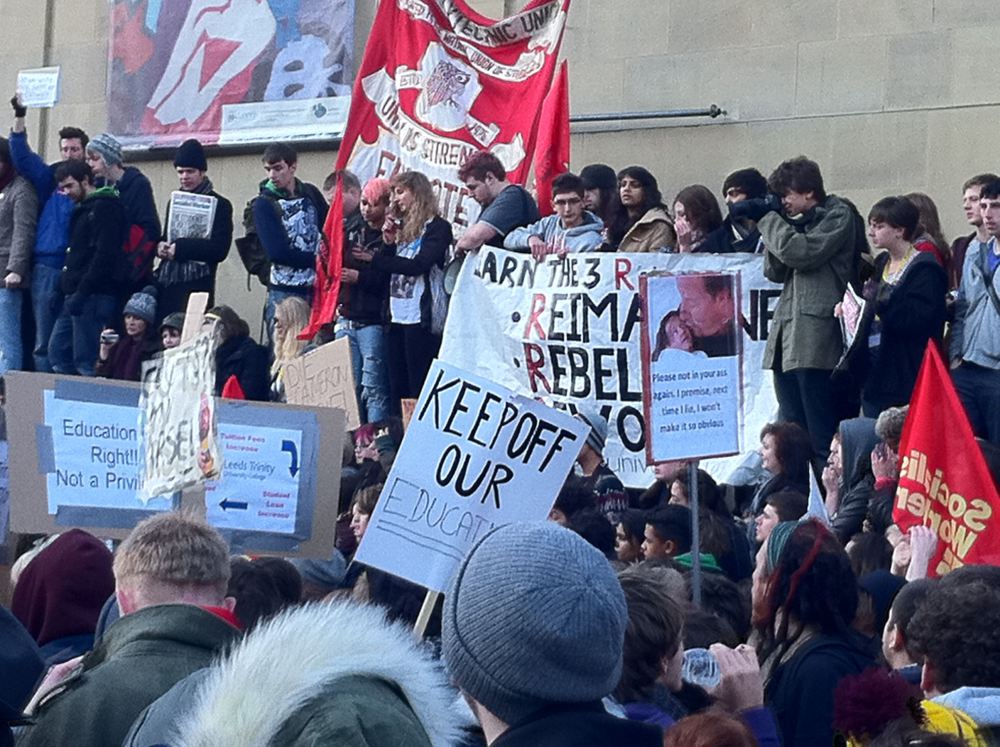
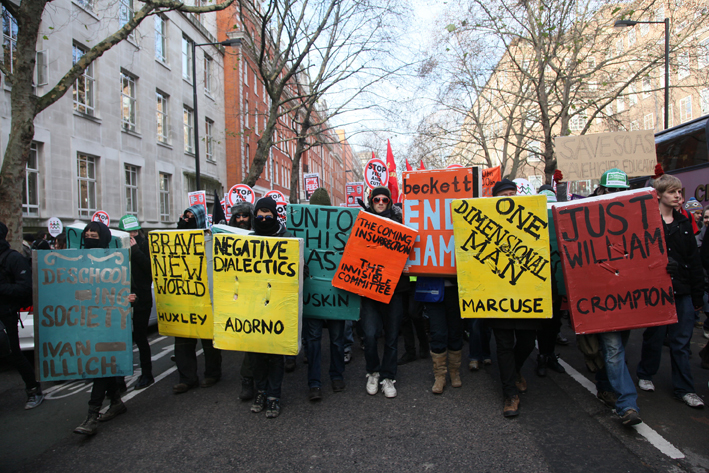 Again, my colleague Mike Neary, who always seems to have the foresight to arrive at the scene before I do, had spoken on the previous day of the Leeds occupation about Student as Producer, a project that ran at Lincoln from 2010-2013.
Again, my colleague Mike Neary, who always seems to have the foresight to arrive at the scene before I do, had spoken on the previous day of the Leeds occupation about Student as Producer, a project that ran at Lincoln from 2010-2013. Their ESRC-funded research project had revealed to us a network of inspiring autonomous social centres across the UK and Europe, which acted as hubs of resistance to the privatisation of public spaces, such as universities. We saw how these co-operatively run Centres collectively broaden and strengthen the efforts of existing social movements by providing space and resource for the practice of different forms of social relations, not based on wage work and private property but instead on mutual aid and the construction of a social commons. Modelled on the social centres, we wanted the Social Science Centre to provide a space for higher education and for developing our work on Student as Producer in ways that were impossible within a mainstream university.
Their ESRC-funded research project had revealed to us a network of inspiring autonomous social centres across the UK and Europe, which acted as hubs of resistance to the privatisation of public spaces, such as universities. We saw how these co-operatively run Centres collectively broaden and strengthen the efforts of existing social movements by providing space and resource for the practice of different forms of social relations, not based on wage work and private property but instead on mutual aid and the construction of a social commons. Modelled on the social centres, we wanted the Social Science Centre to provide a space for higher education and for developing our work on Student as Producer in ways that were impossible within a mainstream university.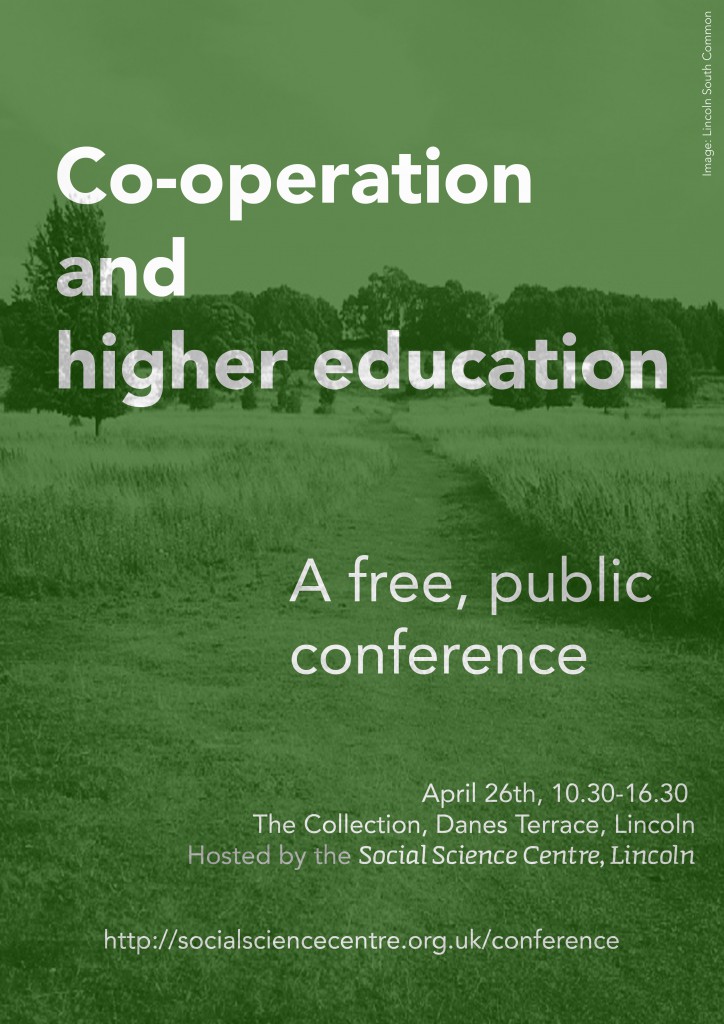 In reimagining the university, I’d like to suggest that we think of ways, not of resisting but rather of overcoming our current historical context and in doing so I want to propose that in addition to democracy, a number of other values can be combined to create a sustained alternative to how we think about the organising principle of wage work and private property in higher education.
In reimagining the university, I’d like to suggest that we think of ways, not of resisting but rather of overcoming our current historical context and in doing so I want to propose that in addition to democracy, a number of other values can be combined to create a sustained alternative to how we think about the organising principle of wage work and private property in higher education.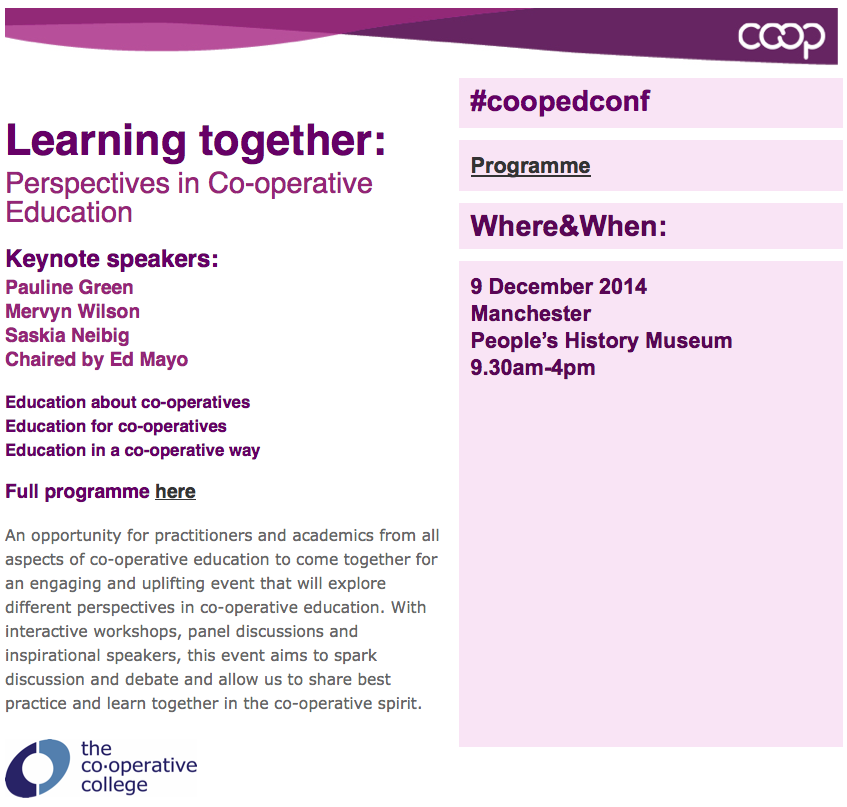 In a recent paper, I have argued that taken as a whole, efforts around co-operative higher education over the last three years can be understood in terms of the three routes I mentioned at the beginning of this talk: Conversion, dissolution, and creation.
In a recent paper, I have argued that taken as a whole, efforts around co-operative higher education over the last three years can be understood in terms of the three routes I mentioned at the beginning of this talk: Conversion, dissolution, and creation.